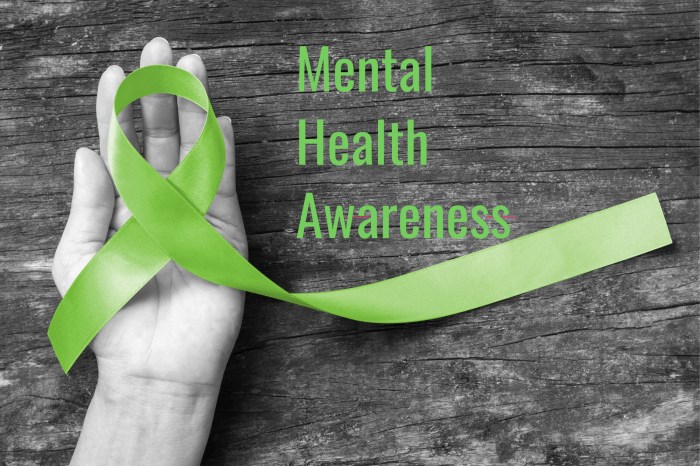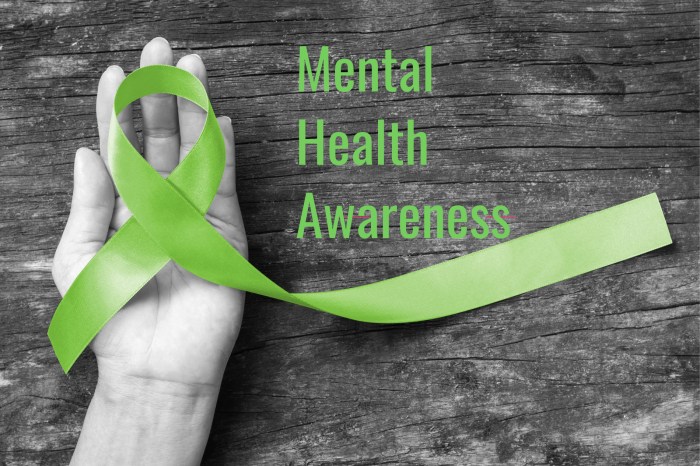Mental Health Awareness takes center stage, inviting readers into a world of crucial insights and impactful discussions. From the importance of awareness to combating stigma, this topic delves into the depths of mental well-being.
Importance of Mental Health Awareness
Mental health awareness is crucial for individuals and society as a whole. By understanding and addressing mental health issues, individuals can lead healthier and more fulfilling lives, while society can benefit from reduced stigma and increased support for those in need.
Positive Impact on Communities
- Increased empathy and support for those struggling with mental health challenges
- Reduced stigma surrounding mental health, leading to more open conversations and acceptance
- Improved overall well-being and productivity in communities
Promoting Mental Health Awareness
Promoting mental health awareness in various settings such as schools, workplaces, and healthcare facilities is essential for creating a supportive environment for individuals facing mental health issues.
- Schools can implement mental health education programs to educate students and provide resources for support
- Workplaces can offer mental health resources and support services to employees to promote a healthy work environment
- Healthcare facilities can prioritize mental health screenings and access to mental health professionals for early intervention
Stigma Surrounding Mental Health: Mental Health Awareness

Stigma surrounding mental health is a significant barrier that prevents many individuals from seeking the help they need.
Common Stigmas Associated with Mental Health
- Belief that mental health issues are a sign of weakness
- Viewing mental health conditions as a choice rather than a medical condition
- Assuming that individuals with mental health issues are violent or dangerous
- Labeling those with mental health concerns as “crazy” or “unstable”
Impact of Stigma on Individuals Seeking Help, Mental Health Awareness
- Causes feelings of shame and guilt, leading to reluctance to seek treatment
- Creates a culture of silence and secrecy around mental health struggles
- Leads to social isolation and discrimination against individuals with mental health conditions
Strategies to Reduce Stigma and Promote Open Conversations
- Education and awareness campaigns to debunk myths and misconceptions about mental health
- Encouraging open dialogue in schools, workplaces, and communities about mental health
- Sharing personal stories and experiences to humanize mental health issues
- Advocating for policies that protect the rights of individuals with mental health conditions
Mental Health Awareness Campaigns

In recent years, there has been a significant increase in mental health awareness campaigns aimed at breaking the stigma and promoting understanding of mental health issues. These campaigns play a crucial role in educating the public and encouraging individuals to seek help when needed.
Examples of Successful Mental Health Awareness Campaigns
- The “Bell Let’s Talk” campaign in Canada has been highly successful in sparking conversations about mental health and raising funds for mental health initiatives.
- The “It’s Okay to Not Be Okay” campaign by the National Alliance on Mental Illness (NAMI) in the United States has been effective in normalizing conversations about mental health struggles.
- The “Heads Together” campaign in the UK, led by the Duke and Duchess of Cambridge and Prince Harry, has focused on ending the stigma surrounding mental health and promoting open discussions.
Effectiveness of Different Approaches in Mental Health Awareness Campaigns
- Personal stories and testimonials from individuals who have experienced mental health struggles can be powerful in humanizing the issue and encouraging others to seek help.
- Collaborations with celebrities and influencers can help reach a wider audience and destigmatize mental health challenges through their platforms.
- Innovative social media campaigns using hashtags, videos, and interactive content can engage younger audiences and promote awareness in a more accessible way.
Role of Social Media in Raising Awareness about Mental Health Issues
Social media plays a crucial role in spreading information and promoting mental health awareness to a global audience. Platforms like Instagram, Twitter, and Facebook provide a space for individuals to share their experiences, resources, and support for those struggling with mental health issues. Social media campaigns can reach a vast number of people quickly and efficiently, making it a valuable tool in raising awareness, challenging stigma, and encouraging open conversations about mental health.
Self-Care and Mental Health Awareness
Self-care practices play a crucial role in promoting mental health awareness. Taking care of oneself physically, emotionally, and mentally can help individuals manage stress, improve their mood, and enhance overall well-being.
Benefits of Self-Care for Mental Health
- Regular exercise can release endorphins, which are natural mood lifters, helping reduce symptoms of anxiety and depression.
- Practicing mindfulness and meditation can promote relaxation, reduce stress, and improve focus and clarity of mind.
- Getting an adequate amount of sleep is essential for cognitive function, emotional regulation, and overall mental health.
Self-Care Tips for Better Mental Well-Being
- Set boundaries: Learn to say no to commitments that may overwhelm you and prioritize your well-being.
- Engage in activities you enjoy: Whether it’s painting, gardening, or reading, make time for hobbies that bring you joy.
- Connect with others: Building and maintaining social connections can provide support and reduce feelings of isolation.
Incorporating Self-Care into Daily Life
- Start your day with a few minutes of deep breathing or stretching exercises to set a positive tone for the day.
- Schedule regular self-care activities in your calendar to ensure you prioritize them amidst your daily responsibilities.
- Practice gratitude by keeping a journal and writing down things you are thankful for each day.
